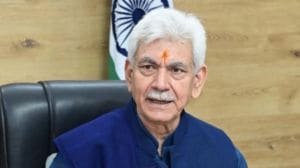India stands together, distinctly on its feet with its sound and strong macroeconomic fundamentals, and it will soon become the third-largest economy, Union Finance Minister Nirmala Sitharaman said on Tuesday. Stating that people outside may bully or call India as a “dead economy”, but India’s numbers speak for itself, she said, adding that those strengths are helping the country to make sure to speak up, take a stand or defend itself.

In a direct reference to the “dead economy” remark for India, which was made by US President Donald Trump over three months ago, Sitharaman said people may taunt from outside, but India, with over 140 crore population, is pushing from the tenth spot to fifth to fourth and soon to the spot of the third-largest economy in the world. “…look at the numbers. Just don’t look at the numbers but analyse them. And that is why I think even internationally, people try to bully us or to say anything differently, we have to have our numbers before us, and we as Indians who are contributing to that economy, should have that faith that we are achieving these goals ourselves. We are achieving. And not get swayed at all by people who say your economy is not up to it. I’m not bringing up the recent controversy of — are we dead? Are we alive? I’m not coming into that. Although that’s actually what I’m talking about.”
Story continues below this ad
“Who can ever tell this population of 140 crore people, who are pushing from tenth to fifth to fourth to third (largest economy), that you’re dead! So, it’s all right for people to taunt us from outside. But, we within the country shouldn’t decry what our people are doing for ourselves. All of us for ourselves are doing remarkably well in pushing the economy further and further. And that is why as a country we were able to get 25 million people out of multi-dimensional poverty. It’s our own people’s contribution. It’s all our contribution. Let’s not decry and let’s not be pessimistic,” she said.
Sitharaman also dispelled concerns that privatisation of public sector banks could affect financial inclusion. “Nationalisation did help in pushing priority sector lending and government programmes, but government control made public sector banks unprofessional,” she said. She added: “…this perception that when you try to make them professional, and if you want to privatise them, which is a Cabinet decision, that objective of taking banking to everyone will be lost, is incorrect.”
The Finance Minister further said India is moving fast on many different parameters, which are largely economic. But, India also has many other strengths, she said: “our defence forces are strong, we are able to stand up and say, we have young people who can do so many things in the name of our startups, the innovation, the IT sectors, but everything put together, what is making us literally stand out is the fast movement between the tenth largest economy in 2014 to fifth and the fourth and now sooner probably to the third. That is what stands up. And that’s the strength with which India can, one, outside, make sure it can speak for itself, stand for itself, defend itself.”
“Equally within the country that’s what is going to bring inclusivity. That’s what is going to wipe out the difference between the rich and the poor, the urban and the rural, the educated-not so educated, man-woman and therefore it is the spread of that economic empowerment which is going to domestically make us strong as much to stand out to defend our positions outside the country. Therefore, it is the strength of the economy. Let’s not forget, that’s a premium strength,” she said.
Story continues below this ad
Highlighting the importance of data and the use of technology, Sitharaman asked the students and researchers at DSE to talk with data, read in between the data and talk for India. “…when we want to look at our economy with newer factors, which are coming into play, the immense importance that technology is acquiring. In fact, at one point in time, I would jocularly say this is the fifth factor of production. Without technology today, your land, labour, capital are all going to go away or lie where they are. Because unless technology comes to play, whether it is in the identification of a piece of land, which a small farmer holds or whether it is in the manufacturing sector, where now increasingly with artificial intelligence coming into play, your manufacturing models are changing, AI is coming. Some are fearing AI — Will it throw people out of jobs? Equally there are people who are using AI to create innovative solutions for all persisting problems, whether it is infrastructure, civic infrastructure or any other medical devices and so on,” she said.
She also said that DSE must train students and even policymakers in advanced Big Data analysis and analytics and AI for analysing economic trends, economic early warnings, improving policy design, and strengthening governance outcomes. “…you could blend economics with data science, environment sciences, and also public policy, so you can give us integrated insight, which will help us rapidly change or tweak policies which are necessary for rapid growth,” she said.
Sitharaman said many international economic theories are western centric. “…many things which can be done in India are being indigenously designed and that’s how it should be. But yet I want theories which are going to be emerging from India, which will not just suit India, but suit the Global South,” she said. She asked the students to leverage the intellectual capital to produce research that directly informs Indian policymaking. “Empirical and data-driven studies are required on, let’s say, fiscal federalism, GST reforms, financial inclusion, employment elasticity. And also climate finance,” she said.
With less than three months remaining for the Budget for the next financial year, the Finance Minister invited students, faculty and researchers of the Delhi School of Economics to meet her and give inputs for the Budget at Kartavya Bhawan, the new premises for the Ministry of Finance after exiting North Block. “Let’s say in the first week of January. Give me ideas for the forthcoming budget…let me start the practice this year, DSE will have an open invitation every year…and that’s with the hope that we’ll have ideas from young minds, who’ve chosen to be in the field of economics, to guide the country’s budget every year. So that we will reach 2047, as we desire, to have a Viksit Bharat. Get the date when you’re ready to come and meet us and brief us. And I assure you, I’ll have the entire Finance Ministry secretaries sit and listen to you, other than myself.”

































